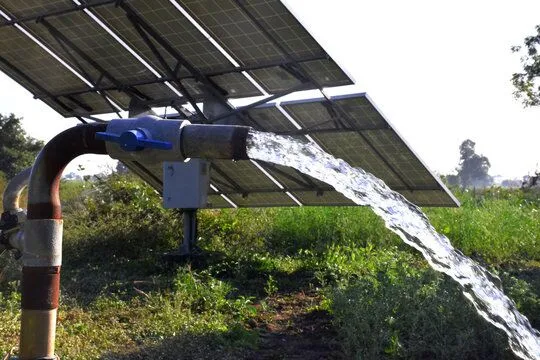Introduction
Water is the lifeblood of agriculture, and its efficient utilization is critical for global food security. In many parts of the world, access to reliable and affordable irrigation systems is limited, hindering agricultural productivity. Traditional water pumps, often powered by electricity or fossil fuels, can be costly and unreliable, particularly in remote or off-grid areas. The adoption of solar-powered water pumps has marked a revolutionary shift in agriculture by providing sustainable, cost-effective, and environmentally friendly solutions for irrigation. In this article, we explore the irrigation revolution brought about by solar-powered water pumps, their benefits, applications, and potential to transform farming practices.
The Solar-Powered Water Pump Revolution
Harnessing Solar Energy: Solar-powered water pumps use photovoltaic panels to convert sunlight into electricity, which, in turn, powers the water pumps. This approach offers a sustainable and renewable energy source, which is abundant in many parts of the world.
Independence from the Grid: One of the key advantages of solar water pumps is their ability to function independently of the electrical grid. This independence is especially vital in remote areas where grid access is limited or unreliable. Solar pumps eliminate the need for costly infrastructure development to extend grid connections to these regions.
Environmental Sustainability: Solar-powered water pumps are environmentally friendly, producing no greenhouse gas emissions or air pollution during operation. This eco-friendly approach aligns with global efforts to reduce the carbon footprint and promote sustainable agriculture.
Benefits of Solar-Powered Water Pumps
The adoption of solar-powered water pumps has brought about a multitude of benefits for farmers and agricultural practices:
Cost-Effective Operation: Solar energy is a free resource, and once the initial installation cost is covered, the operational cost of solar pumps is minimal. This is in stark contrast to traditional pumps that rely on electricity or fossil fuels, subject to fluctuating prices.
Reliability and Consistency: Solar pumps operate as long as there is sunlight, providing a consistent and reliable water supply during daylight hours. Excess energy can be stored in batteries for use during non-sunlight hours, ensuring a continuous water supply.
Increased Crop Yields: The availability of reliable irrigation through solar pumps allows farmers to optimize their irrigation schedules, leading to higher crop yields and improved crop quality.
Energy Independence: Solar-powered pumps empower farmers to be self-sufficient in terms of energy. They reduce dependence on external energy sources, contributing to energy security for farming operations.
Reduced Environmental Impact: Solar pumps contribute to a healthier environment by eliminating emissions associated with fossil fuel-based pumps. This not only benefits the planet but also enhances the health of farming communities.
Applications of Solar-Powered Water Pumps
The versatility of solar-powered water pumps allows them to be applied in various agricultural scenarios:
Small-Scale Farming: Smallholder farmers in developing countries often lack access to electricity and reliable irrigation. Solar pumps are ideal for such farmers, enabling them to cultivate crops and improve their livelihoods.
Large Commercial Farms: Even large-scale commercial farms are recognizing the benefits of solar pumps. They can supplement or replace traditional pumps, reducing operational costs and environmental impact.
Community Water Supply: Solar pumps are used to provide clean and reliable water supply to rural communities. They can help tackle water scarcity issues, improving living conditions and agricultural activities.
Aquaculture: Solar water pumps are employed in fish and shrimp farming, ensuring consistent water supply and oxygenation in ponds.
Drip Irrigation: Solar pumps are compatible with drip irrigation systems, which are highly efficient in water usage and are beneficial for water-scarce regions.
Challenges and Considerations
Despite the many advantages, the adoption of solar-powered water pumps is not without challenges:
Initial Cost: The upfront cost of purchasing and installing solar-powered water pumps, including solar panels and batteries, can be substantial. This can be a barrier for small-scale farmers, necessitating financial support or innovative financing solutions.
Technical Expertise: Proper installation and maintenance of solar pumps require technical knowledge that may not be readily available in all regions. Training and support are essential for successful adoption.
Battery Maintenance: The performance and lifespan of batteries used in solar systems can be affected by environmental factors, including temperature and humidity. Maintenance and replacement of batteries can be a concern.
Variability in Sunlight: The effectiveness of solar pumps is contingent upon the availability of sunlight. Cloudy days and inclement weather can affect their performance. Backup power sources or hybrid systems may be needed in regions with inconsistent sunlight.
Scaling Up: While solar pumps are well-suited for small- to medium-scale farming, scaling up to meet the needs of larger commercial farms may require significant investment and planning.
Future Prospects
The future of solar-powered water pumps looks promising, with several developments on the horizon:
Cost Reduction: As solar technology advances and economies of scale are realized, the initial cost of solar pumps is expected to decrease, making them more accessible to a broader range of farmers.
Hybrid Systems: Combining solar pumps with grid electricity or other renewable energy sources can provide a more reliable water supply and cater to large-scale agricultural operations.
Innovative Financing: The introduction of innovative financing models, such as pay-as-you-go schemes, can help farmers overcome the initial cost hurdle.
Research and Development: Continued research and development efforts will result in more efficient solar panels and water pump systems, further enhancing their performance and reliability.
The adoption of solar-powered water pumps represents a profound irrigation revolution in agriculture. These systems provide sustainable, cost-effective, and environmentally friendly solutions for a wide range of applications, from smallholder farms to large commercial operations. While challenges remain, ongoing technological advancements, government support, and innovative financing models are expected to drive the continued adoption of solar water pumps, contributing to global food security and sustainable agricultural practices. As the world grapples with the challenges of a changing climate and the need to reduce greenhouse gas emissions, solar-powered water pumps are a shining example of how clean energy solutions can revolutionize the way we farm and manage our precious water resources.


No comments yet